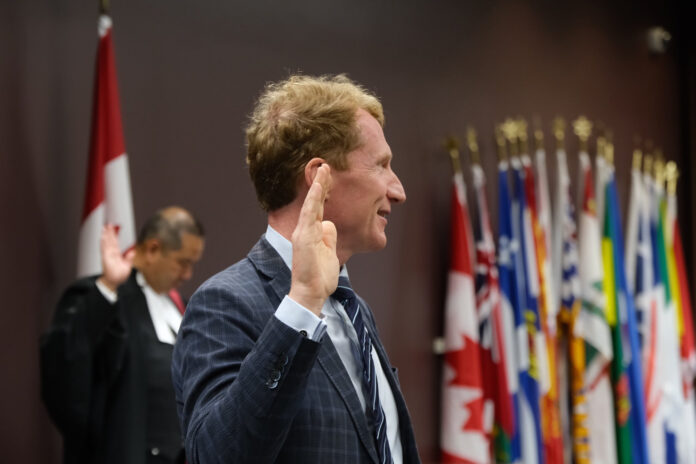

St. Thomas University’s vice president of enrolment management said he is hoping the federal government will walk back their recent international student cap announcement, as it will negatively impact the university.
On Jan. 22 the federal government announced an international student cap, approving only 360,000 undergraduate study permits in 2024, a 35 per cent reduction from 2023. This two-year policy, introduced by Minister of Immigration Marc Miller, aims to target institutional “bad actors” and limit the impact international students make on Canada’s housing market.
With few details released by the government, Ryan Sullivan, vice president of enrolment management at STU, said he is growing increasingly concerned.
“We get increasingly concerned specifically because the reality is that this region, Atlantic Canada, still needs more people,” said Sullivan.
Sullivan described the institutional “bad actors” that the government is referring to as private for-profit colleges who “over promise and under deliver” for international students.
Admitting Atlantic Canada has its housing challenges, Sullivan doesn’t feel like STU should be punished for issues in other parts of the country.
“We don’t have the same issues that they’re dealing with in Ontario and British Columbia primarily … It feels like the federal government has implemented a policy to address a very specific issue, but they’ve made the policy across the board. Penalizing those of us who have done it responsibly,” said Sullivan.
STU provides guaranteed housing to students and still has capacity for their residents, according to Sullivan.
The university has international students from 40 different countries making up 11 per cent of its population. Sullivan said that over his 20 years with the university working with international students and seeing the impact they have has been a rewarding experience.
“Over my time at STU seeing the number of our international students who have been student-athletes, on the student’s union, starting organizations, clubs, societies on campus … Really contributing to the overall community here,” said Sullivan.
Alberto Chávez, president of STU’s International Student Association (STUISA), agrees that the university is being unfairly punished with the new cap.
“Because some institutions weren’t as regulated and were overlooked in their immigration process, now everyone has to pay,” he said. “I hope STU doesn’t have to reduce their international students because we bring a lot of culture to campus.”
While the policy grandfathers international students already in the country that need a study permit extension, Chávez has a cousin hoping to come to Canada for university, seeking the same opportunities he has had.
“It’s really sad to see that a lot of international students in general will not have the same chances to get here and develop their skills just as I did,” he said.
Sullivan said the process for international students to get to campus for the first day of classes takes months of coordination, which has been abruptly interrupted by doubts surrounding the policy. Sullivan said that STU is over halfway through that process with the incoming class. Students have already been accepted and received scholarships in some cases.
“This coming out of left field … It’s creating stress. We can imagine if you were in another country trying to figure out ‘am I going to Canada or not?’” said Sullivan.
There is national speculation of tuition increases next year to supplement the loss of international tuition. When asked about the possibility, Sullivan said any change would go through the budget process and be transparent. An 11 per cent international population is not as significant as Holland College, which has a population of 30 per cent.
“It’s still substantial, but it’s a lot less than it is elsewhere,” said Sullivan. “We’d like to see the number of international students grow at STU, but at least be able to maintain and for us to do that we know we still have to be an affordable option.”
The province will be responsible for the distribution of permits based on population. Sullivan said STU has been working closely with the province and everyone is waiting to hear more from the federal government.
